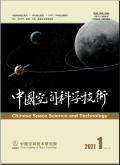中国空间科学技术2024,Vol.44Issue(4):11-19,9.DOI:10.16708/j.cnki.1000-758X.2024.0053
欠驱动航天器模糊自适应增强耦合姿态控制
Fuzzy gain-adapting coupling attitude control for under-actuated spacecraft
摘要
Abstract
During rapid orbital maneuvers,aiming at the strong attitude disturbance problem caused by thrust misalignment and installation errors under solid propulsion,an underactuated spacecraft intelligent attitude control method based on thrust vector control technology is proposed.Firstly,the dynamic model of spacecraft attitude error is established,and the underactuated characteristic of thrust vector control inputs are analyzed.Then,considering the issues of strong disturbance uncertainty and weak coupling in the roll channel,an underactuated intelligent control law based on enhanced coupling strategy and adaptive fuzzy observer is designed.The fuzzy logic function is used to approximate the strong disturbance uncertainty term and introduced into the control law to achieve underactuated intelligent attitude control of spacecraft.The stability of the system has been proven through Lyapunov theory.Finally,through numerical simulation and comparison with the hierarchical sliding mode control method,the simulation results show that the designed method can shorten the three-axis attitude stability time by 14%,and can effectively eliminate the static error caused by weak roll channel,which provides a foundation for strong disturbance suppression technology during rapid orbital maneuvers.关键词
快速轨道机动/欠驱动控制/智能控制/增强耦合/自适应模糊观测器Key words
rapid orbital maneuver/underactuated control/intelligent control/gain-adapting coupling/adaptive fuzzy observer分类
航空航天引用本文复制引用
孟中杰,卢俊杰..欠驱动航天器模糊自适应增强耦合姿态控制[J].中国空间科学技术,2024,44(4):11-19,9.基金项目
国家自然科学基金(62173273) (62173273)
陕西省自然科学基础研究计划(2020JC-19) (2020JC-19)

